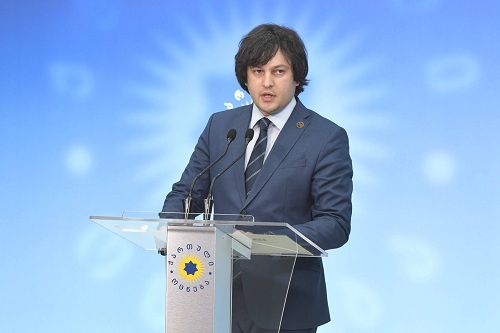
Parliament Speaker Irakli Kobakhidze speaking at the Georgian Dream party headquarters, April 12, 2018. Photo: facebook.com/KobakhidzeOfficial
Parliament Speaker Irakli Kobakhidze criticized the recent survey of the U.S.-based rights watchdog Freedom House, saying the report, which lowered Georgia’s overall democracy score, was “biased” against the Georgian government, and was influenced by “pseudo-liberal forces” that “are challenging the governments of Georgia and the United States.”
Speaking at a special press briefing at the Georgian Dream (GD) party headquarters yesterday, Irakli Kobakhidze emphasized that the country had gone through “fundamental progress” towards democracy, freedom and human rights protection since parliamentary polls in 2012, which unseated ex-President Mikheil Saakashvili’s United National Movement party.
“What preceded the year 2012, was rigged elections, zero balance among branches of government, gross human rights violations, including torture, rape, systemic practice of confiscation of property, full subordination of the judiciary to the Justice Ministry, [and] the government’s total arbitrariness,” Parliament Speaker Kobakhidze added.
Irakli Kobakhidze then stressed that while these “problems” had been successfully addressed in subsequent years, no significant changes were reflected with respect to Georgia’s overall democracy score, as well as in terms of specific evaluation categories, including independent media, judicial framework and independence, and civil society.
Kobakhidze said identical scores in the media category in 2012 and 2018 were “ridiculous,” and demonstrated the report’s “bias.” “In 2012, the government had an absolute monopoly over the media; all three national broadcasters - Rustavi 2, Imedi and GPB – had been illegally subjected to the influence of Mikheil Saakashvili and UNM in 2004-2012.”
The Speaker added that identical rankings in the judicial independence category were also “ridiculous.” “The judiciary was under the total control of the Justice Ministry before 2012, and the consequence was illegal rulings against thousands and tens of thousands of people; the court was successfully used against businesses, and as a tool for political persecution.”
“Unchanged civil society score was also surprising; while the civil society was largely loyal to the government before 2012, in subsequent years its attitudes have become more oppositional, which should have been reflected positively on the score, but the authors have demonstrated their partiality in this case as well,” Kobakhidze said.
The report assessment that Saakashvili’s possible detention “would further complicate GD’s relations” with Europe and the U.S., was “alarming” and “surprising,” according to Kobakhidze. “We are happy that our western partners are positively disposed to pro-western parties and politicians … but this support no longer applies to Saakashvili and his party.”
Kobakhidze added that the report assessment that ex-PM Bidzina Ivanishvili’s influence remained “one of the key impediments” to Georgia’s democratic functioning, resonated with “the artificial picture drawn by Rustavi 2 and Saakashvili’s other friends.” “Speaking of informal governance without specifying its signs lacks argument.”
“Pseudo-Liberal” Forces in Georgia and the United States
Parliament Speaker Irakli Kobakhidze touched upon the report sources as well, saying the authors relied on the positions of those Georgia-based non-governmental organizations, “which lack competence and are biased against the authorities.”
“These are the so-called liberal, rather pseudo-liberal forces, which are challenging the governments of Georgia and the U.S.,” Kobakhidze stated, adding that the best illustration of that was “the leadership of the National Democratic Institute in Georgia, for whom criticism of its own government is an everyday thing.”
Speaker Kobakhidze also emphasized that these forces had “nothing in common with liberalism and liberal values.” “Our government is exactly a liberal government [in its classic sense], and I would even say, the most liberal government in the history of Georgia.”
“We rest on values such as democracy, rule of law, human rights protection, justice, equality and tolerance, but at the same time, pseudo-liberalism and the forces, which are challenging our national identity, traditions and the Georgian churches, as well as the forces, which are challenging the very same values in the U.S., are unacceptable for us,” he said.
Reactions by Prime Minister, Presidential Administration
Prime Minister Giorgi Kvirikashvili slammed the report as well, saying the assessments were “extremely biased,” and “based on absolutely unbalanced information.” “I think, the organization needs to think over before publishing such biased information on the level of democracy in Georgia.”
The Prime Minister added that the GD government had achieved “great progress” in strengthening the country’s democracy in the post-2012 period. “We should, of course, not be complacent about it; we still have a long road to walk for establishing a genuine European democracy,” he also noted.
President’s Parliamentary Secretary Ana Natsvlishvili, on her part, stressed it would be beneficial for the government to “use its time and resources not on criticizing Freedom House, but on facing, recognizing and addressing the problems” that the report had identified.
“When a very authoritative international organization, based on very authoritative local groups, concludes that there are problems in terms of media freedom, judiciary and local governance, it means the government has to pay due attention to the issues,” Natsvlishvili also noted.

 RSS
RSS Mobile
Mobile Twitter
Twitter Facebook
Facebook